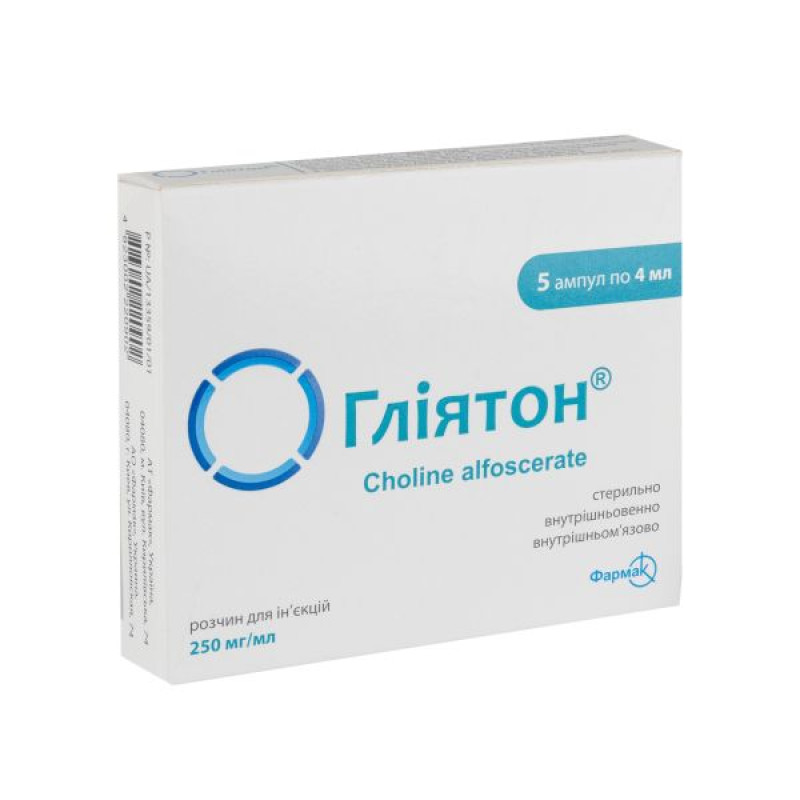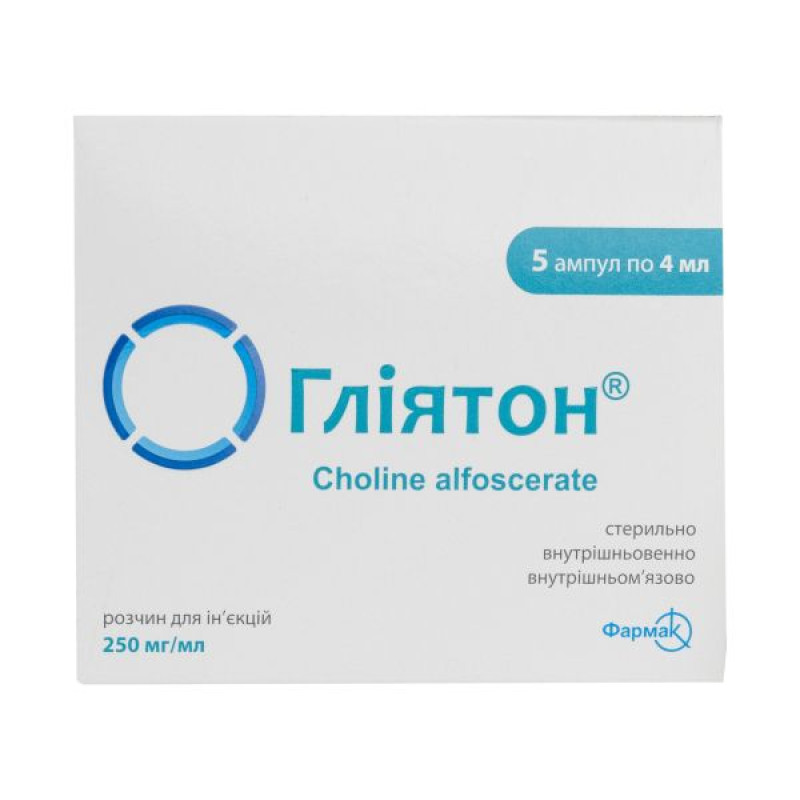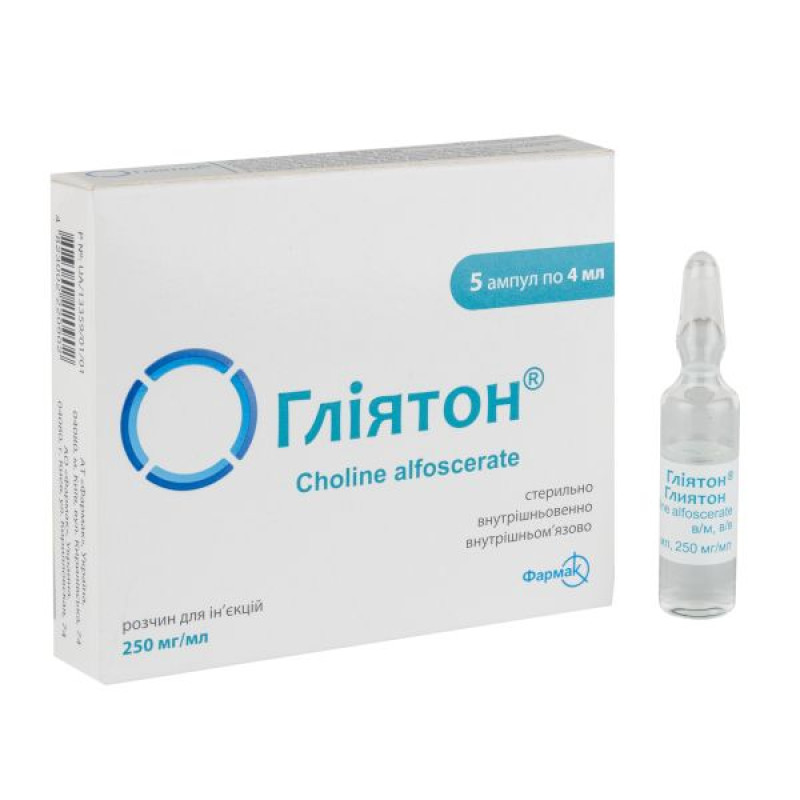Gliaton solution for injection 250 mg/ml ampoule 4 ml in blister No. 5

Instructions Gliaton solution for injection 250 mg/ml ampoule 4 ml in blister No. 5
Composition
active ingredient: choline alfoscerate;
1 ml of solution contains choline alfoscerate in terms of 100% substance 250 mg;
excipient: water for injections.
Dosage form
Solution for injection.
Main physicochemical properties: transparent colorless solution.
Pharmacotherapeutic group
Agents affecting the nervous system. Parasympathomimetics. Choline alfoscerate. ATX code N07A X02.
Pharmacological properties
Pharmacodynamics
Choline alfoscerate is a drug belonging to the group of central cholinomimetics with a predominant effect on the central nervous system (CNS). Choline alfoscerate as a choline carrier and a precursor of phosphatidylcholine is potentially capable of preventing and correcting biochemical damage, which is of particular importance among the pathogenic factors of psychoorganic involutional syndrome, i.e. it can affect the reduced cholinergic tone and the altered phospholipid composition of nerve cell membranes. The drug contains 40.5% metabolically protected choline. Metabolic protection ensures the release of choline in the brain. Choline alfoscerate has a positive effect on memory functions and cognitive abilities, as well as on indicators of emotional state and behavior, the deterioration of which was caused by the development of involutional brain pathology.
The mechanism of action is based on the fact that when choline alfoscerate enters the body, it is broken down by enzymes into choline and glycerophosphate: choline takes part in the biosynthesis of acetylcholine, one of the main mediators of nervous excitation; glycerophosphate is a precursor of phospholipids (phosphatidylcholine) of the neuronal membrane. Thus, choline alfoscerate improves the transmission of nerve impulses in cholinergic neurons; it has a positive effect on the plasticity of neuronal membranes and the function of receptors. Choline alfoscerate improves cerebral blood circulation, enhances metabolic processes in the brain, activates the structures of the reticular formation of the brain and restores consciousness in traumatic brain injury.
As a result of the conducted open, multicenter, randomized, comparative, parallel study, a statistically significant reduction in the time to awakening of a patient on artificial lung ventilation was established in the group of patients who were given Gliaton®, solution for injection, compared with the group where this drug was not used. The median time to awakening in the Gliaton® group was 8 min, and in the group where Gliaton® was not used - 17 min (p < 0.001).
Vital signs (blood pressure [BP], heart rate [HR], and body temperature) did not undergo clinically significant changes during therapy in both groups and were similar, indicating no negative effect of the study drug on these parameters.
The study demonstrated greater effectiveness of the drug Gliaton® in preventing the development of postoperative cognitive dysfunction, compared to the group of patients who did not use Gliaton®.
The results obtained indicate the safety and good tolerability of the drug Gliaton®, solution for injection, 250 mg/ml, 4 ml in ampoules, administered intravenously at 1 g (1 ampoule) 20 minutes before the end of the operation, then 24, 48 and 72 hours after the end of the operation, in patients with planned surgical interventions in abdominal surgery and gynecology, performed using total intravenous anesthesia with artificial lung ventilation. During the study, no case of serious adverse reactions was recorded. All recorded adverse reactions were mild and did not require any medical measures or cancellation of the study drug. Gliaton® in the doses studied did not negatively affect vital signs (BP, HR and body temperature), laboratory parameters of complete blood count, complete urine analysis, biochemical blood test.
According to preclinical safety and efficacy data, the drug Gliaton® is able to prevent cognitive neuropathic disorders induced by surgical intervention. Parenteral administration of this drug in operated animals allows to maintain higher cortical functions, learning and memory abilities, behavioral characteristics at the level of non-operated animals. Gliaton® improves the implementation of skills associated with hippocampal function, prevents depressive behavior, increases the exploratory activity of animals and maintains the level of general cognitive functions after surgical intervention, which indicates powerful neuroprotective properties, activation of neuronal plasticity and increased cholinergic signaling in the CNS. Gliaton® significantly reduces the manifestations of the inflammatory process in brain tissues after surgical intervention, which correlates with the data obtained in 49 behavioral tests and indicates its therapeutic effect on the central link in the pathogenesis of postoperative cognitive disorders.
When choline alfoscerate is administered, an average of almost 88% of the dose is absorbed. The drug accumulates mainly in the brain (45% of the drug concentration in the blood), lungs and liver. Elimination of the drug occurs mainly through the lungs in the form of carbon dioxide (CO2). Only 15% of the drug is excreted in the urine and bile.
Indication
Acute period of severe traumatic brain injury with predominantly brainstem level of damage (impaired consciousness, comatose state, focal hemispheric symptoms, symptoms of brainstem damage).
Degenerative-involutional cerebral psychoorganic syndromes or secondary consequences of cerebrovascular insufficiency, i.e. primary and secondary disorders of mental activity in the elderly, characterized by memory impairment, confusion, disorientation, decreased motivation and initiative, decreased ability to concentrate; changes in the emotional and behavioral spheres: emotional instability, irritability, indifference to the environment; pseudomelancholia in the elderly.
For the prevention of the development of postoperative cognitive dysfunction in patients after elective surgical interventions in abdominal surgery and gynecology, performed using total intravenous anesthesia with artificial lung ventilation.
Contraindication
Known hypersensitivity to the drug or its components.
Patients with psychotic syndrome, with severe psychomotor agitation.
Pregnancy or breastfeeding.
Interaction with other medicinal products and other types of interactions
Clinically significant drug interactions with other drugs have not been established.
Use during pregnancy or breastfeeding
The drug is contraindicated for use during pregnancy or breastfeeding.
Ability to influence reaction speed when driving vehicles or other mechanisms
The drug does not affect driving and working with other mechanisms.
Method of administration and doses
In acute conditions, Gliaton® should be administered intramuscularly or intravenously slowly at 1 g (1 ampoule) per day for 15–20 days. Then, after the patient's condition has stabilized, switch to the dosage form of the drug in capsules.
For the prevention of the development of postoperative cognitive dysfunction in patients after elective surgical interventions in abdominal surgery and gynecology, performed using total intravenous anesthesia with artificial lung ventilation, administer 1 g (1 ampoule) intravenously 20 minutes before the end of the operation, then 24, 48 and 72 hours after the end of the operation.
Children
There is no experience with the use of Gliaton® in children.
Overdose
In case of overdose with Gliaton®, which may manifest as nausea, anxiety, agitation, insomnia, the dose of the drug should be reduced. Therapy is symptomatic.
Adverse reactions
As a rule, the drug is well tolerated even with prolonged use. Injection site reactions are possible. During the first days or weeks of treatment, the following side effects may occur: anxiety, agitation, insomnia. These symptoms are temporary and do not require discontinuation of treatment, but a temporary dose reduction is possible.
Nausea (mainly due to secondary dopaminergic activation), decreased blood pressure, headache, very rarely abdominal pain and short-term confusion may occur. In this case, the dose of the drug should be reduced.
Hypersensitivity reactions are possible, including rash, itching, urticaria, angioedema, and skin redness.
Expiration date
3 years.
Do not use the drug after the expiration date indicated on the package.
Storage conditions
Store in a place protected from light at a temperature not exceeding 25 °C.
Keep out of reach of children.
Incompatibility
Do not use in the same container with other medicines.
Packaging
4 ml in ampoules No. 5 (5x1) or No. 10 (10x1); No. 5 (5x1) or No. 10 (5x2) in blisters.
Vacation category
According to the recipe.
Producer
JSC "Farmak".
Location of the manufacturer and its business address
Ukraine, 04080, Kyiv, Kyrylivska St., 74.
Last viewed date.
There are no reviews for this product.
There are no reviews for this product, be the first to leave your review.
No questions about this product, be the first and ask your question.








